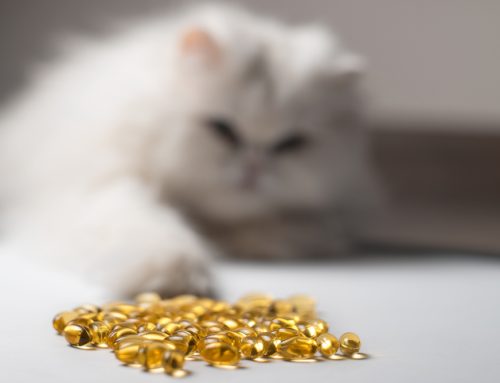Behold the mighty mushroom. For thousands of years, this unassuming—and often unattractive—fungi has been celebrated for its potent healing powers, whose benefits extend to humans and animals. Used with caution and expertise, mushrooms can complement your pet’s health care regimen. Learn why our Meridian Veterinary Care veterinarians may recommend mushrooms for your pet.
Because mushrooms can be contraindicated, harmful, or deadly when given inappropriately, ensure you administer your pet’s mushroom supplements under your veterinarian’s supervision and guidance. In addition, before beginning medicinal mushroom therapy, tell your veterinarian about all the supplements or medications your pet is taking.
Why are mushrooms beneficial for pet health?
Many cultures embrace mushrooms’ natural healing properties. While more than 10,000 mushroom species are recognized, veterinary professionals use seven mushroom species for medicinal purposes in dogs and cats. Although each mushroom type has specific properties and uses, their general benefits include:
- Immune support — Mushrooms are packed with immune-boosting and free radical-fighting antioxidants.
- Enhanced nutrition — Mushrooms are a robust source of protein, complex carbohydrates, enzymes, vitamins, minerals, and fatty acids.
- Anti-inflammatory properties — Mushrooms promote natural inflammatory responses, and healthy cellular function reduces harmful or chronic inflammation caused by inflammatory diseases (e.g., arthritis, some cancers, digestive disorders).
- Anticancer components — Although all medicinal mushrooms provide antioxidants and immune health support, research suggests that a compound in turkey tail (i.e., Coriolus versicolor) mushrooms may extend life expectancy of dogs with hemangiosarcoma and potentially other cancers.
What common pet conditions benefit from mushrooms?
Veterinary professionals recommend medicinal mushrooms as a general health supplement or as a known disease’s targeted therapy. Our Meridian Veterinary Care team uses mushrooms for a range of pets’ conditions, including:
- Arthritis
- Cancer
- Liver and kidney disease
- Diabetes
- Gastrointestinal disorders
- Blood disorders
- Nervous system disorders
- Decreased immune health
- Cognitive dysfunction (i.e., senility)
- Urinary tract disorders
What medicinal mushrooms are administered to pets?
Medicinal mushrooms are available in pet-friendly formulations—powders, capsules, chews, and liquids—which make dosing easy, reliable, and convenient. Pet-friendly mushroom supplements contain one or more of the following fungi:
- Shiitake — Often selected for their immune-strengthening ability to fight cancer and viruses by stimulating white blood cells and improving blood flow, shiitake mushrooms also boast an impressive number of enzymes and amino acids.
- Reishi — The immortality mushroom is known for its antioxidant properties. Reishi mushrooms improve overall health, and are commonly administered to pets with cancer, allergies, heart disease, upper respiratory viruses, and arthritis.
- Cordyceps — This tiny, skinny mushroom has antifungal and antibacterial properties, and a unique ability to help reduce blood sugar—making it advantageous for diabetic pets.
- Maitake — Maitake mushrooms can inhibit or slow tumor growth, and provide immune system support during chemotherapy treatment, which make these fungi appropriate for cancer patients. Like the cordyceps, maitake mushrooms also help control blood sugar.
- Turkey tail — Turkey tail contains essential sugars that stimulate the immune system and protect against infection and viruses. In a University of Pennsylvania School of Veterinary Medicine study, a turkey tail mushroom compound helped extend the life of dogs with hemangiosarcoma—an aggressive and malignant blood cancer.
- Lion’s mane — This impressive mushroom can enhance brain and nervous system health, and improve senior pets’ cognitive function. Because lion’s mane promotes nerve health, veterinary researchers hope this fungi may eventually prove beneficial to dogs suffering from degenerative myelopathy (DM).
- Chaga — This black mushroom closely resembles tree bark, but is second only to chocolate as the world’s most antioxidant-rich food. In addition to potential cancer-fighting abilities, chaga mushrooms can improve digestive health, and may slow liver disease progression.
Eat this, not that—Mushroom safety for pets
Accessing mushrooms’ power means respecting their potency—and their unknowns. Although mushrooms have been used for millennia, few studies definitively prove their benefits or define their safe use. Your Meridian Veterinary Care veterinarian will advise you on the proper administration, dosing, and storage of your pet’s mushroom supplement—but always keep in mind these caveats:
- Many mushrooms are deadly — Give your pet only veterinarian-recommended mushroom supplements. Do not be fooled by look-alike mushrooms or presume all mushrooms are the same.
- Never feed your pet raw mushrooms — Your pet may have difficulty digesting uncooked mushrooms, which can also be extremely toxic. In their raw form, beneficial chaga mushrooms contain natural xylitol—a known dog toxin.
- Mushrooms are not an FDA-approved treatment — While your Meridian Veterinary Care veterinarian has extensive knowledge and experience using mushrooms for pets, the U.S. Food and Drug Administration (FDA) does not currently approve medicinal mushroom treatment.
- Pet supplements are poorly regulated — Some available supplements may not actually contain the listed ingredients, making them useless—or worse, harmful—for your pet. To avoid risking your pet’s health, stick with your veterinarian’s recommended brand and formulation.
- Side effects are possible — Like all supplements, mushrooms may cause side effects that include digestive upset or dizziness. Overdosing may result in seizures, liver damage, or severe vomiting and diarrhea.
When are mushrooms contraindicated for pets?

While you may be enticed to improve your pet’s health with the help of mushrooms’ magic, fungi are not right for every pet. Some health conditions may contraindicate or complicate your pet’s mushroom-based therapy, including:
- Known mushroom allergy
- Blood or clotting disorders
- Low blood pressure
- Immune-mediated disorders
- Some liver and kidney conditions
Your Meridian Veterinary Care veterinarian will review your pet’s health history, current diet, medication, and supplement regimen to determine if mushrooms are a safe and appropriate therapy.
Mushroom supplements are one of the many integrative therapeutic services we offer to enhance your pet’s health. To learn whether mushrooms or other supplemental therapy is right for your pet, contact our Meridian Veterinary Care team, or schedule an appointment online.







Leave A Comment